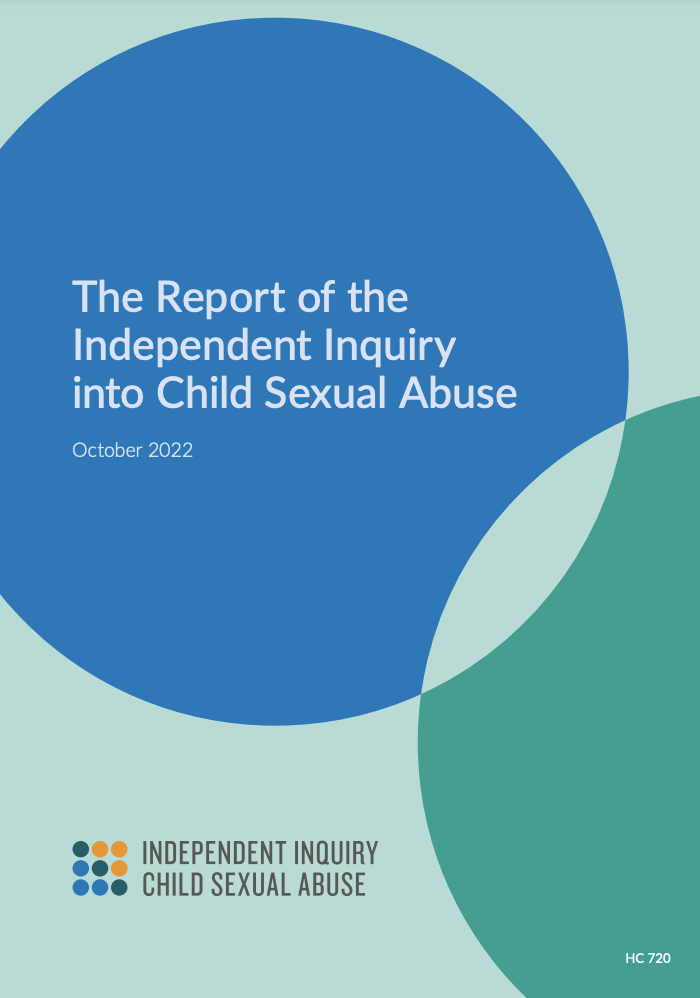This report is the final statutory report published by the Independent Inquiry into Child Sexual Abuse (the Inquiry). In accordance with the Terms of Reference, it sets out the main findings about the extent to which State and non-State institutions failed in their duty of care to protect children from sexual abuse and exploitation and makes recommendations for reform. It draws on the Inquiry’s 15 investigations and 19 related investigation reports, the Interim Report of the Independent Inquiry into Child Sexual Abuse and 41 other Inquiry reports and publications. The Inquiry has made 20 recommendations in this report. These final recommendations complement the 87 recommendations contained in the previously published investigation reports (including six which have been restated).
There are nearly 13 million children in England and Wales, each of whom needs and deserves to be protected from harm. Babies, toddlers and children are potentially at risk, with current estimates indicating that 1 in 6 girls and 1 in 20 boys experience child sexual abuse before the age of 16. In March 2020, the Office for National Statistics estimated that 3.1 million adults in England and Wales had experienced sexual abuse before the age of 16. Reflecting the guiding principle that the child’s welfare is paramount, the Inquiry’s recommendations are focussed on making England and Wales places for children to grow up safely and thrive.
The work of the Inquiry over the past seven years demonstrates that:
• child sexual abuse and exploitation takes many forms but can involve vile and painful acts such as vaginal and anal rape;
• children, particularly those who are sexually exploited, are often degraded and abused by multiple perpetrators;
• historically, inadequate measures were in place to protect children from the risk of being sexually abused – sometimes there were none at all;
• individuals and institutions often thought children were lying when they tried to disclose what was being done to them;
• victims were frequently blamed as being responsible for their own sexual abuse;
• within statutory agencies with direct responsibility for child protection there was too little emphasis on the complex and highly skilled work of child protection. Decisions about children were not unequivocally based on the paramount interests of the child;
• multi-agency arrangements still lack focus on child protection;
• there is still not enough support available to both child and adult victims and survivors;
• child sexual abuse is not a problem consigned to the past, and the explosion in online-facilitated child sexual abuse underlines the extent to which the problem is endemic within England and Wales; 2 The Report of the Independent Inquiry into Child Sexual Abuse
• the devastation and harm caused by sexual abuse cannot be overstated – the impact of child sexual abuse, often lifelong, is such that everyone should do all they can to protect children; and
• this is not just a national crisis, but a global one.
At the heart of this report are the Inquiry’s recommendations to help protect children. There needs to be a greater priority and focus, politically and across society as a whole, on protecting children from sexual abuse. The establishment of the Child Protection Authorities in England and in Wales, coupled with national public awareness campaigns, are designed to ensure that the spotlight remains directed at preventing child sexual abuse.
These recommendations will be reinforced by cabinet-level ministerial positions for children to provide senior leadership and increased priority within government. One of the aims of the public awareness campaign is to inform the public about the action they should take if they know or suspect a child is being sexually abused. This will complement the recommendation for a new law of mandatory reporting making it a legal requirement for those who work in regulated activity or work in a position of trust to report child sexual abuse.
The impact of past failures to protect children from sexual abuse and to support those who have been harmed is incalculable. To address this, the Inquiry considers that a redress scheme must be established to make some reparation for the harm suffered.

